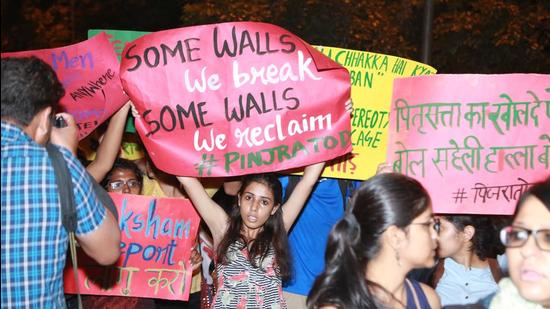Jailed activists Devangana Kalita, Natasha Narwal work to help prison community
In the pamphlet released by the collective, both Narwal and Kalita – in separate letters – speak about their experiences in the jail and their work with the prison community involving working at a legal aid centre, computer centre, library, running yoga sessions before the pandemic hit, and working with the children in the prison.
To mark one year of incarceration of jailed student activists Devangana Kalita and Natasha Narwal, who are charged with conspiring to orchestrate the 2020 Delhi riots, students’ collective Pinjra Tod on Wednesday released a pamphlet detailing the activities undertaken by the duo in Tihar jail, that include running a computer centre, legal aid centre, and engaging with the women and children in prison.

Both Kalita and Narwal are a part of the women’s collective Pinjra Tod since its inception in 2015. “As Natasha and Devangana complete a year in prison, we share with you all a booklet with some of their artwork, excerpts from their prison letters written to us and some of the work they have done within the prison,” the collective said in a statement on Wednesday.
The two women are not the only prisoners working behind bars. Convicted prisoners are allotted work within the jail complex -- in places such as jail factory, kitchen and gardens. Under trial prisoners are given a choice if they wish to work and help the prison department in running the complex. They are also paid daily wages. For example --- former Congress leader Sushil Sharma, convicted for his wife, Naina Sahni’s murder, helped prisoners at the legal aid centre. Former Delhi police inspector Anil Kumar convicted in the Connaught Place fake encounter case, worked in the offices within the jail complex and was part of preparing reform activities for prisoners. Almost all prisoners, barring a few, choose to work as it helps them pass their time behind bars and also use their skills in helping the prison department.
In the pamphlet released by the collective, both Narwal and Kalita – in separate letters – speak about their experiences in the jail and their work with the prison community involving working at a legal aid centre, computer centre, library, running yoga sessions before the pandemic hit, and working with the children in the prison. Children below 6 years are allowed to stay with their mothers inside the prison. Until last month, there were around 25 children along with their mothers inside the prison.
The children and their mothers were released last week to ensure that they did not catch the Covid-19 infection.
The two women had also been holding reading sessions of feminist novels before the pandemic and making artwork around it that was shared by the group on Wednesday.
Sandeep Goel, Director General Prisons, said, “If the conduct of the inmates is disciplined, we do involve them in several activities as per their area of knowledge. While all activities are suspended now due to the Covid-19 pandemic, some prisoners have been involved in the legal aid cell assisting visiting lawyers or helping with the crèche facilities or even training people to use computer facilities at our computer centre. Inmates are also involved in different cultural activities including Women’s Day.”
While the lawyers of the two women have accused Delhi police of arresting them on false charges because they were prominent members of the protests against the Citizenship Law, police have maintained that the two women were active members in the conspiracy to start the riots in parts of northeast Delhi last year. At least 53 people died and 607 were injured when clashes broke out between Hindus and Muslims in February last year.
Last month, Narwal’s father passed away after contracting Covid-19 following which the PhD student was given a three-week interim bail. She returned to prison on May 30.
The booklet was released a day after Pinjra Tod held a virtual event inviting friends, family, and activists to speak and mark one year of their incarceration.
Jawaharlal Nehru University Students’ Union president Aishe Ghosh said, “We may come from different organisations, but we have seen all these JNU students around, growing up with us and amidst us. Today, they are behind bars and they are organising activities inside prison, helping people.”
Prison expert, Sunil Gupta, who was a law officer in Tihar for over three decades, said that except dangerous prisoners, most inmates are involved in various activities inside jails. “Whosoever wants to work with the children of incarcerated women are allowed to do so irrespective of the offence they are facing. Several vocational skills or recreational activities involving music and sports are also held so that prisoners don’t have any negative thoughts and are kept engaged,” he added.





